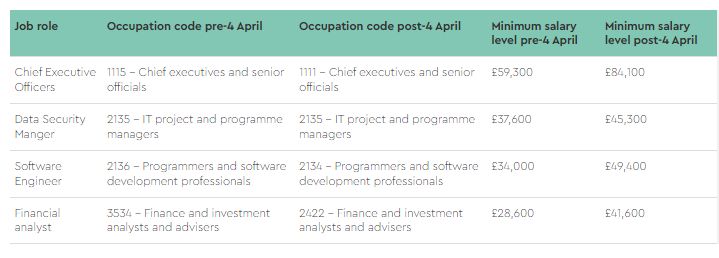Further to the Government's announcements of planned changes to UK Immigration Rules aimed at reducing net migration, more details have now been released in relation to the upcoming changes, which are set to take effect from 4 April 2024. These changes will impact employers sponsoring visas for employees under the Skilled Worker and Global Business Mobility: Senior or Specialist Worker visa routes. Some of the changes will have a significant impact, particularly for employers recruiting at entry level or for roles based outside London where salaries may be lower.
Employers sponsoring visas under the Skilled Worker or Global Business Mobility visa routes must pay at least the minimum salary threshold set by the Government or the 'going rate' for the role, whichever is higher. From 4 April 2024, both the minimum salary thresholds and 'going rates' are increasing.
Changes to Skilled Worker route – effective 4 April 2024
The Skilled Worker route covers new hires and permanent hires to the UK. From 4 April 2024:
- the minimum salary threshold increases from the current £26,200 to £38,700 or the 'going rate' salary for the job type, if this is higher
- the minimum 'going rate' for each job type will also increase and in some cases the going rate salary will be higher than the £38,700 minimum threshold
- the ability for an employer to pay a lower salary to sponsored employees who qualify as 'new entrants' will be retained, although the minimum level for new entrants will increase
- the current 'Shortage Occupation List' (or SoL) will be replaced by the new 'Immigration Salary List' which has a substantially reduced number of roles, and excludes tech sector roles on the current SoL (this follows the recommendations from the Migration Advisory Committee ("MAC") rapid review)
- a lower salary threshold will apply to jobs on the updated Immigration Salary List
- transitional provisions will cover existing Skilled Worker visa holders
For employers with applications in the pipeline, it will be prudent to assess the implications of the changes and if possible, consider applying before the changes take effect if necessary.
Changes to Global Business Mobility: Senior or Specialist Worker route – effective 4 April 2024
The Global Business Mobility: Senior or Specialist Worker ("GBM:SSW") route allows sponsor employers to sponsor visas for temporary transfers and secondments from their linked offices outside the UK. From 4 April 2024:
- the minimum salary threshold increases from the current £45,800 to £48,500 or the 'going rate' salary for the job type, if this is higher
- the minimum 'going rate' for each job type will also increase and in some cases the going rate salary will be higher than the £48,500 minimum threshold under this route
- transitional provisions will cover existing GBM:SSW visa holders
Illustrative table of changes to 'going rates' effective 4 April 2024
Below is a summary table setting out the changes to the minimum salary levels for key roles under the new SOC 2020 occupation codes for illustrative purposes. The post-4 April rates indicated below relate to new applications submitted on or after 4 April, based on a 37.5 hour contractual working week.

There are a number of nuances to the changes which will need to be carefully considered when making applications from 4 April, to ensure the requirements are met. For example, note that software engineers will now fall under occupation code 2134 instead of occupation code 2136 under the current Rules. Sponsor employers will therefore need to be particularly mindful where changes have affected the codes they have previously used and ensure they are using the correct updated code for new applications from 4 April.
We are currently working with a number of clients to review sponsorship requirements they have in the pipeline with a view to urgently submitting applications likely to be affected by these changes where possible. Please do get in touch with your usual contact if you would like to discuss the implications of these changes.
The content of this article is intended to provide a general guide to the subject matter. Specialist advice should be sought about your specific circumstances.







